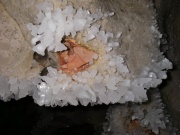Calcite (Inventory)/Spar/nailhead
From LagWiki
| Line 2: | Line 2: | ||
The '''nailhead''' field should be used to list stations which exhibit nailhead [[Calcite (Inventory)/Spar|spar]]. | The '''nailhead''' field should be used to list stations which exhibit nailhead [[Calcite (Inventory)/Spar|spar]]. | ||
| - | Nailhead spar typically is "flatter" or more "cubic" than [[Calcite (Inventory)/Spar/dogtooth|dogtooth]] spar. The shape is a [[rhombohedron]] where each facet is a rhombus | + | Nailhead spar typically is "flatter" or more "cubic" than [[Calcite (Inventory)/Spar/dogtooth|dogtooth]] spar. The shape is a combination of a [[rhombohedron]] where each facet is a rhombus, and a [[scalenohedral|scalenohedron]] where each facet is a triangle. This is basically a combination of the two primary crystaline shapes of calcite in a single crystal. Except for the shape of each crystal it has characteristics very similar to dogtooth spar and can be found in similar locations. |
| - | They can occur singularly; but are usually found in clusters. They can be found lining the insides of [[vug]]s or cavities and cracks but can also occur on the ceiling or walls directly. They formed when the cave was [[phreatic]] | + | They can occur singularly; but are usually found in clusters. They can be found lining the insides of [[vug]]s or cavities and cracks but can also occur on the ceiling or walls directly. They formed when the cave was [[phreatic]] so individual crystals can grow to be quite large; but, are usually small. They can be obscured by other formations such as [[Calcite (Inventory)/Flowstone|flowstone]], [[Calcite (Inventory)/Popcorn|popcorn]], crusts or staining. When looking for nailhead spar, take the time to look into cracks and vugs in the walls, floor and ceiling. And don't forget to examine breakdown -- it may possess a vug containing nailhead spar. |
| + | |||
| + | ==References== | ||
| + | *Hill, Carol; Paolo Forti (1997) ''Cave Minerals of the World (Second Edition ed.)'' National Speleological Society p 101 ISBN: [[Special:Booksources/1-879961-07-5|1-879961-07-5]] | ||
{{Cave inventory}} | {{Cave inventory}} | ||
[[Category:Needs references]] | [[Category:Needs references]] | ||
Revision as of 04:01, 1 May 2011
The nailhead field should be used to list stations which exhibit nailhead spar.
Nailhead spar typically is "flatter" or more "cubic" than dogtooth spar. The shape is a combination of a rhombohedron where each facet is a rhombus, and a scalenohedron where each facet is a triangle. This is basically a combination of the two primary crystaline shapes of calcite in a single crystal. Except for the shape of each crystal it has characteristics very similar to dogtooth spar and can be found in similar locations.
They can occur singularly; but are usually found in clusters. They can be found lining the insides of vugs or cavities and cracks but can also occur on the ceiling or walls directly. They formed when the cave was phreatic so individual crystals can grow to be quite large; but, are usually small. They can be obscured by other formations such as flowstone, popcorn, crusts or staining. When looking for nailhead spar, take the time to look into cracks and vugs in the walls, floor and ceiling. And don't forget to examine breakdown -- it may possess a vug containing nailhead spar.
References
- Hill, Carol; Paolo Forti (1997) Cave Minerals of the World (Second Edition ed.) National Speleological Society p 101 ISBN: 1-879961-07-5

